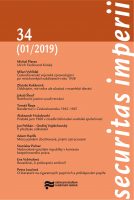V předtuše odkvétání. Československo a Jugoslávie v prvních měsících normalizace
In Anticipation of Fading: Czechoslovakia and Yugoslavia in the Initial Months of the Normalisation Era
Author(s): Jan Pelikán, Ondřej VojtěchovskýSubject(s): History of Communism
Published by: Ústav pro studium totalitních režimů
Keywords: Czechoslovakia; Yugoslavia; normalisation; Czechoslovak-Yugoslav relations; Soviet-Yugoslav relations; late socialism; national issue; passport and visa policy; travelling during socialism; traffickin
Summary/Abstract: The study maps the period from the spring of 1969 to the early 1970 as Husák’s suite established itself at the helm of the Communist Party of Czechoslovakia (KSČ) and the state. Its stance towards Yugoslavia was ambiguous. The conservative and dogmatist members of the new regime considered the Yugoslav “revisionists” to be the inspiration for and the supporters of the Prague Spring. A part of the normalisation suite including Gustáv Husák himself wished to renew good relations with Belgrade and obtain a gesture of recognition from it to boost its own legitimacy. The Yugoslav leaders insisted on condemning the Soviet invasion in August 1968 while accepting the new status quo. They tried to avoid accusations of actively interfering with Czechoslovakia’s internal matters since Yugoslavia’s own foreign policy strategy was based on the principle of non-interference. Czechoslovak-Yugoslav relations were influenced by the Soviet Union, which normalised its relations with Yugoslavia for pragmatic reasons again after a brief period of deterioration. However, both Soviets and Yugoslavs used the Czechoslovak platform to present more critical and offensive stances than they would show to each other. In effect, Czechoslovak-Yugoslav relations remained markedly more reserved than Soviet-Yugoslav relations of the period. The arrival of new power structures in Prague did not affect the practical level of the relations, in particular in economic terms, since both sides were extremely interested in cooperation. The study also analyses the Slovak aspect of relations to Yugoslavia and the impact of political matters on social phenomena such as tourism and travel.
Journal: Securitas imperii
- Issue Year: 2019
- Issue No: 34
- Page Range: 162-196
- Page Count: 35
- Language: Czech

